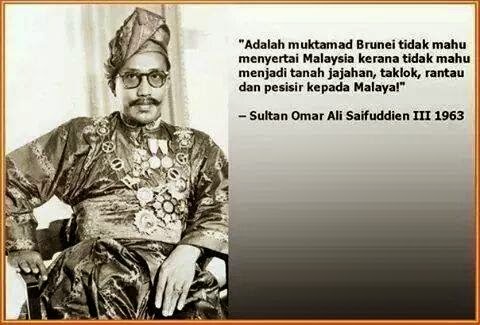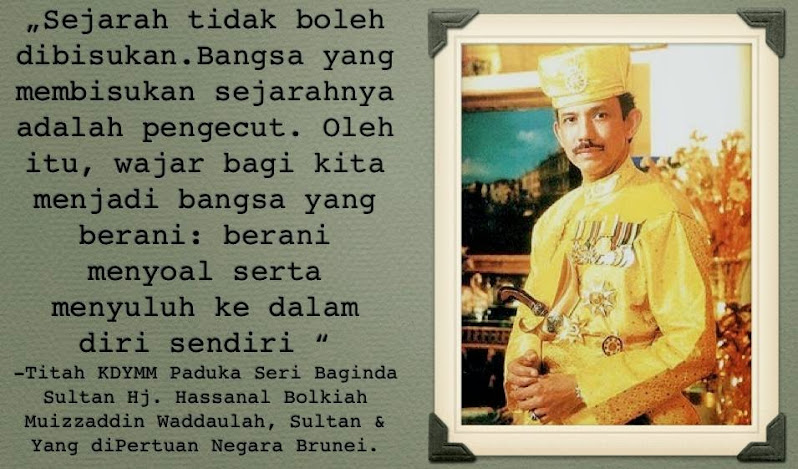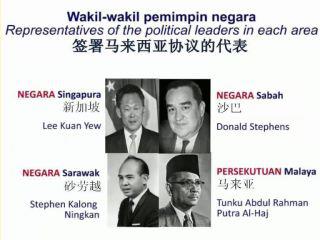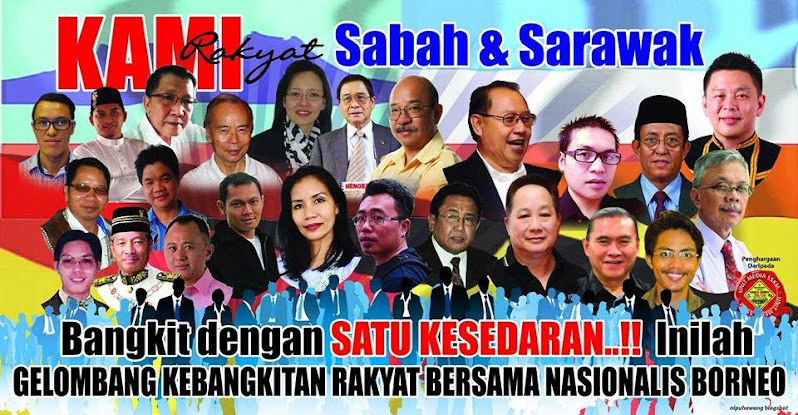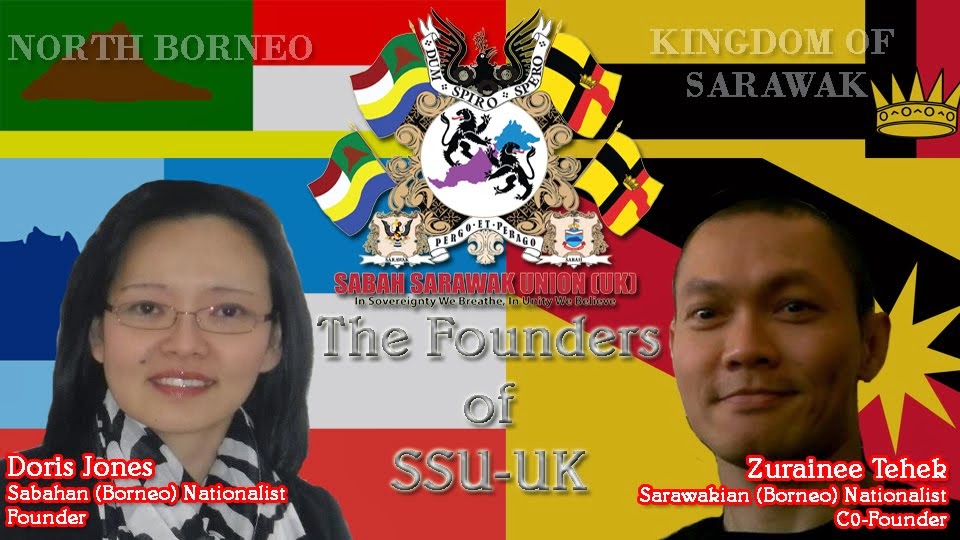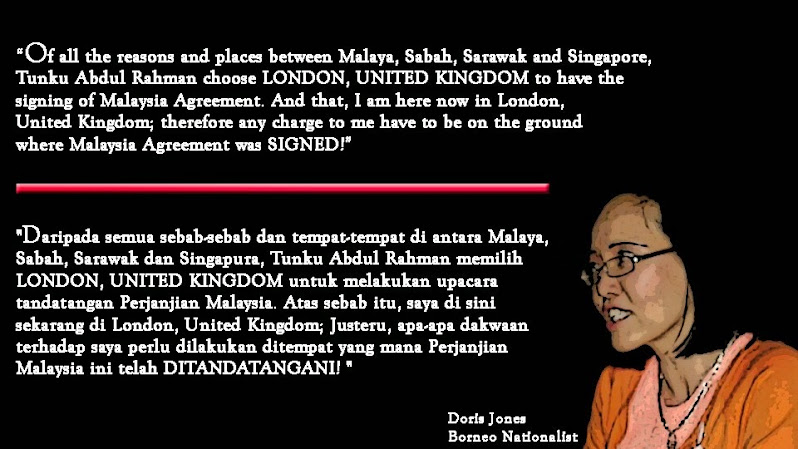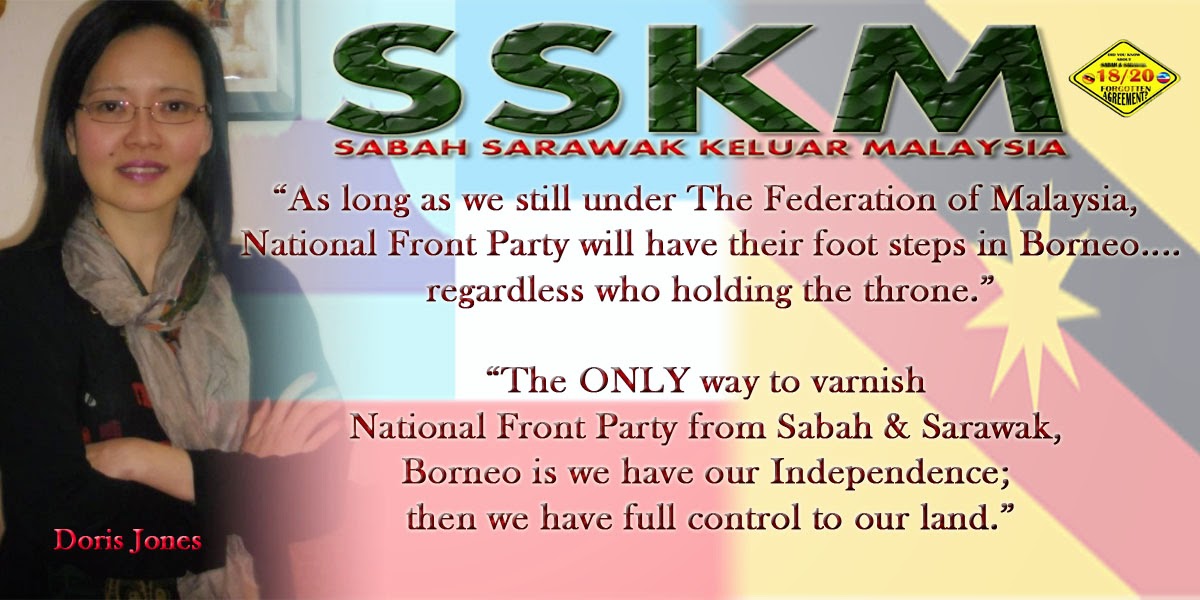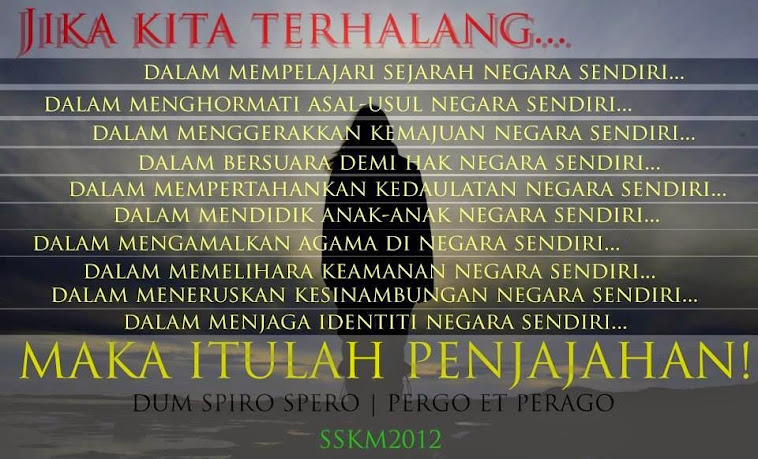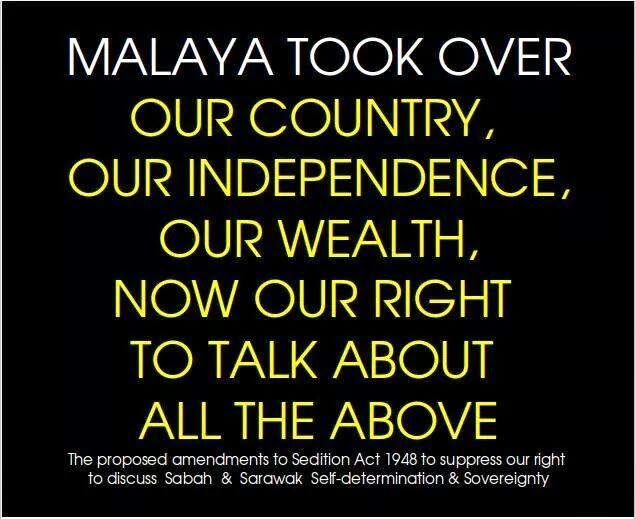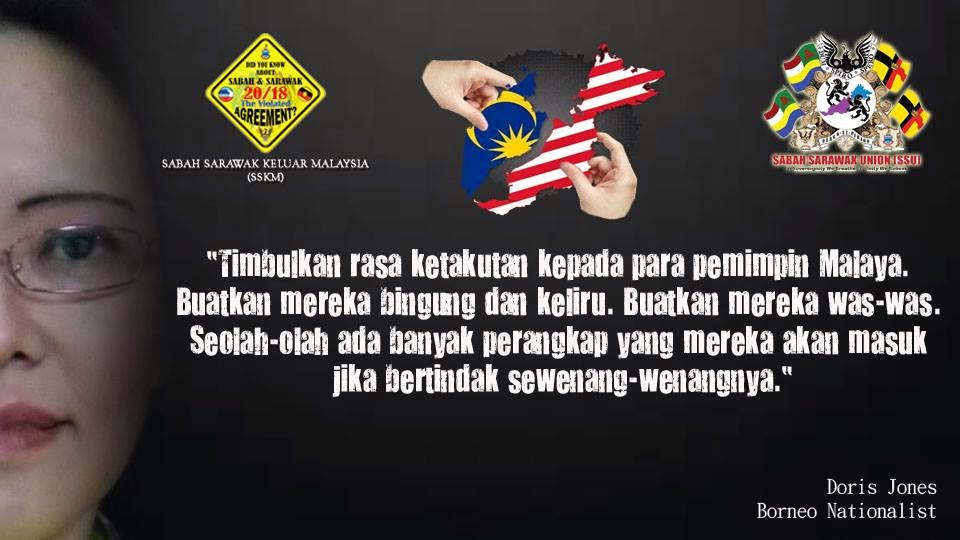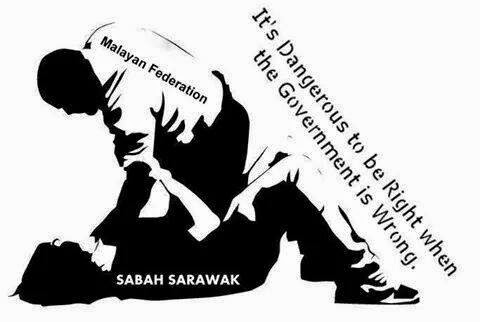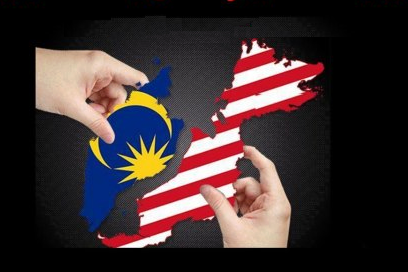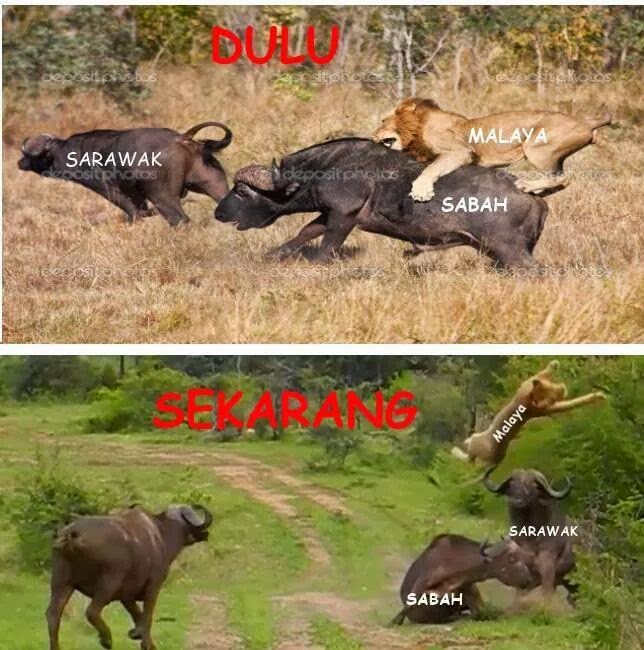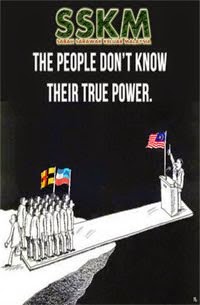Tuesday 16 September 2014
Tuesday, September 16, 2014
Brunei
,
Exposing the Truth
,
Fact
,
History
,
North Borneo
,
Sabah Sarawak Union (SSU)
,
SSKM
,
Sultan Brunei
,
Sulu
No comments
"Tiada Istilah Tuntutan Sulu Lagi!"
Selama ini Bangsa Negara Sabah telah ditakutkan dan ditipu oleh kerajaan persekutuan tanah melayu yang telah menyamar menjadi kerajaan persekutuan malaysia bahawanya jikalau tidak undi kerajaan bn-umno, sultan sulu kononnya akan mengambil Negara Sabah.
Disini, satu Pendedahan Sejarah Berfakta daripada Kerajaan Negara Brunei telah MENAFIKAN AKAN DAKWAAN DAN KENYATAAN KONONNYA SULTAN BRUNEI TELAH MEMBERIKAN BAHAGIAN PANTAI TIMUR KEPADA sultan sulu!
Selama ini, TIDAK PERNAH SEINCI TANAH PUN YANG PERNAH DIBERIKAN KEPADA sultan sulu... Semuanya adalah propaganda bn-umno dan juga manipulasi ahli sejarawan longkang malaya yang tidak menjalankan kajian dengan tulus.
Ahli sejarawan longkang malaya harus berasa malu dan bertanyakan diri mereka apakah mereka layak bergelar professor sejarah?
Penipuan dan permainan manipulasi sejarah untuk perkara ini kini sudah ditelanjangkan bulat-bulat... Jikalau ada kenyataan yang mengatakan lagi perkara seperti tuntutan sulu, rakyat Negara Sabah boleh SAMAN kepada orang yang mengeluarkan kenyataan tidak bertanggungjawab itu.
Sebarkan...
Tuesday, September 16, 2014
British
,
Brunei
,
Exposing the Truth
,
Fact
,
History
,
North Borneo
,
Sabah
,
Sultan Brunei
No comments
"How Brunei lost its northern province?"
NOT much is known historically about our neighbouring state, Sabah. Not much is also known on how its name was derived. Some say Sabah obtained its name from "Pisang Saba," the banana tree that grew predominantly along Borneo's coastal areas.
Some suggested that Sabah was derived from the Malay word "sabak" which is the place for or act of boiling to extract palm sugar. In Brunei Malay, "saba" means upstream (like Kampong Saba). Sabah is located to the northwest, or upstream of Brunei. Sabah has been a part of Brunei since the 15th century.
In the mid-19th century, Sarawak was being governed by the Brookes. Brunei's remaining province of Sabah was to remain untouched but not for long. By the years of 1865 and 1878, no less than three groups from three different countries attempted to control the northern part of Brunei's remaining territory.
The very first group was from United States of America. Brunei's relationship with the Americans started much earlier. An American warship, the USS Constitution, arrived in Brunei in 1845, seeking a commercial treaty and exclusive rights to the coal deposits in Brunei.
However at the time, Brunei was still seeking British protection and was unwilling to seek American support. But after the British naval attacks in 1846 and the loss of Labuan, Brunei decided that it needed to seek other powers to counter the British.
In 1850, Brunei agreed to sign a US-Brunei Treaty of Friendship and Commerce when Joseph Balestier, an American proposed the treaty. He became the first American Consul-General in Brunei. However despite the treaty no American commercial activity took place until 1864.
In 1864, CL Moses was appointed as the American Consul General in Brunei Darussalam. He signed another treaty with Sultan Abdul Momin and obtained territories from Sulaman River to Paitan River. This area consisted of twenty one districts. The lease was to last for a period of ten years, which consisted almost the entire North Borneo. He paid $4,500 annually.
Moses also paid an additional $4,000 annually and managed to lease additional areas from Pengiran Temenggong Pengiran Anak Hashim. The districts included those from Paitan to Kimanas including two islands, Balabak and Pahlawan.
Moses promised that he would bring economic benefits as well as help recover debts by China Steamship and Labuan Company which were then leasing coal mines in Muara.
The Sultan even provided Moses with a consulate building. However Moses failed to deliver his promises. He became unpopular with the Sultan and frictions between the two developed. In the end Moses set fire to the consulate and blamed the Sultan to get compensation. But a US government inquiry cleared the Sultan and Moses soon lost his job.
Soon after that Moses left for Hong Kong where he met WJ Torrey. Torrey was an American businessman. Both Moses and Torrey set up a new company called the American Trading Company.
Torrey went to Brunei to renegotiate with the Sultan. He was appointed as the Supreme Ruler and Governor of Sabah with the title of Raja of Ambong and Marudu. However in developing Kimanis, Torrey lost a great deal of his money. He could not pay the Sultan the amount agreed for the lease.
With Moses transferring his rights to Torrey, it enabled Torrey to sell all the rights to Baron Gustav von Overbeck.
Baron von Overbeck was the consul of the Austro-Hungarian Empire in Hong Kong. He bought the concession rights in Sabah from Torrey. Later Baron von Overbeck together with Alfred Dent of Hong Kong formed a partnership and formed the Dent Company. In 1877, Baron von Overbeck visited Brunei to negotiate a new lease with Sultan Abdul Momin. The latter agreed and a treaty was signed that same year. Sultan Abdul Momin appointed Baron von Overbeck as the Maharaja of Sabah and Raja of Gaya and Sandakan and in return, the Baron shall pay $12,000 per year and additional $3,000 to the Temenggong.
To be on the safe side, since Sabah was also claimed by the Sultan of Sulu, Baron Overbeck negotiated a treaty with the Sultan of Sulu. He signed an agreement with the Sultan of Sulu and agreed to pay him $5,000 annually. The Sultan appointed him as Dato Bendahara and Raja of Sandakan in 1878.
Baron von Overbeck however faced financial problem. He could not get any support from the Austro-Hungarian government. So he decided to sell his share to Alfred Dent.
In 1881 Alfred Dent later managed to get a royal charter to set up another company called the British North Borneo Company in London. William Hood Treacher was appointed the first governor of North Borneo.
The British North Borneo Company gradually established its rule over the territories it had leases. They even bought over other territorial rights which were not included in the original lease from other Brunei Pengirans and nobles.
At the same time, in awarding the Royal Charter, the British government assumed a form of sovereignty over the state especially its foreign relations.
Because of this, the other western powers in the area immediately took renewed interest in Borneo and Malaya. However the Spanish agreed to British control over northern Borneo because the British accepted Spanish control over the Sulu Archipelago. The Germans also accepted British control over Sabah because the British agreed to accept German control over New Guinea.
It was the Dutch that tried to claim some land near Sandakan in 1879 but the British North Borneo Company objected to it. To solve the problems, both the Dutch and the British agreed to divide Borneo into a British area in the north and a Dutch area in the south.
With Rajah Brooke in Sarawak pursuing its expansionist policy, the British could not have two separate policies of restraining one while allowing the other.
These two were allowed to begin a "contest" to gain more and more of Brunei's remaining territories. Sarawak managed to get Baram and later Trusan and Limbang while Sabah managed to get Padas. In 1888, North Borneo similarly to Brunei became a British protectorate. The Company's rule in North Borneo had the greatest impact on the development of the region. A system of indirect rule was established in the administration of North Borneo.
The British North Borneo Company effectively ruled up to 1942, after more than 60 years in Sabah, when the World War Two erupted. Japanese forces occupied Sabah until she was liberated by the Allied Forces in 1945. After the war, North Borneo was administered by the British Military Administration until civil government was restored on July 15, 1946.
In 1946, Sabah was placed under the British Crown as the British North Borneo Company could not afford to rebuild Sabah after the devastation of the War. The destruction of the capital Sandakan by allied bombing was so complete that Jesselton (now Kota Kinabalu) was chosen as the alternative post-war capital and it has remained since then.
Sabah joined Malaysia in 1963 when Malaysia was formally established, on 16 September 1963 and North Borneo's name was changed to Sabah. Preceding this, North Borneo obtained self-government from the British on 31 August 1963. Sabah entered a new era when she became part of Malaysia.
The writer runs a website on Brunei at bruneiresources.com.
The Brunei Times
Tuesday, September 16, 2014
Brunei
,
Exposing the Truth
,
Fact
,
History
,
North Borneo
,
Sabah
,
Sultan Brunei
,
Sulu
No comments
"Sabah and the Sulu claims"
THE 1968 Programme Book for the Coronation of His Majesty Sultan Haji Hassanal Bolkiah Muizzaddin Waddaulah as the 29th Sultan and Yang Di-Pertuan of Brunei Darussalam, had two interesting documents inserted inside. The documents were reproduction of two treaties taken from microfilm kept at the Public Record Office in London.
The first treaty was signed by Brunei's 24th Sultan, Sultan Abdul Momin, appointing Baron de Overbeck as the Maharaja Sabah, Rajah Gaya and Sandakan signed on 29th December 1877. The second treaty was signed by Sultan Jamalalulazam of Sulu appointing Baron de Overbeck as Dato Bendahara and Raja Sandakan on 22nd January 1878, about three weeks after the first treaty was signed.
That begs the question: Who was responsible for Sabah or North Borneo as it was known then towards the end of the 19th century? That probably has a bearing on the event now unfolding in Lahad Datu in Sabah, where a group of armed men supposedly from the Sultanate of Sulu and North Borneo is claiming that they are the rightful owners of Sabah.
Many of the early modern accounts of written history in Brunei noted that Sulu was given possession of Sabah or parts of Sabah for help rendered to Sultan Muhydin, the 14th Sultan of Brunei who fought a civil war against the 13th Sultan of Brunei, Sultan Abdul Mubin.
Sultan Abdul Mubin usurped the throne after killing Sultan Muhammad Ali when the latter tried to stop Sultan Abdul Mubin from taking his revenge for the death of his son killed by the son of Sultan Muhammad Ali. Sultan Abdul Mubin appointed Sultan Muhydin as Bendahara but eventually Sultan Muhydin tricked Sultan Abdul Mubin into leaving Brunei for Pulau Cermin and appointed himself as the new Sultan of Brunei. The two Sultans fought against each other and Sultan Muhyidin finally triumphed, said to be due to the assistance provided by the Sulu Sultanate.
Sir Hugh Low, writing in the Journal of the Straits Branch of the Royal Asiatic Society (JSBRAS) published on 5 June 1880 entitled 'Selesilah (Book of Descent) of the Rajas of Bruni', wrote that "by the assistance of a force from the Sultan of Soolok, the forts on the island (Pulau Cermin) were captured".
Earlier Sir Hugh Low described the negotiation between Sulu and Brunei: "the Bataraa of Soolok went up to Bruni and met the Sultan Muaddin and having feasted and drank, the Sultan asked the Batara for his assistance to destroy the enemies at the island, promising that if the island should be conquered, the land from the North as far as westward as Kimani should belong to Soolook".
HR Hughes-Hallett writing in the Journal of the Malayan Branch of the Royal Asiatic Society published in August 1940 entitled A Sketch of the History of Brunei wrote: "by the beginning of the 18th century, the kingdom (Brunei) had been territorially diminished by the cession to the Sultan of Sulu in the north".
CA Majul in his book Muslims in the Philippines (1973) referred to a letter from Sultan Jamalul Azam of Sulu to the Governor General of Spain on 17 September 1879 that the coast area from Kimanis to Balikpapan was to pay tribute to the Sultan which he said proved that the Brunei territory facing Suluk was ceded to Suluk.
Interestingly enough, Pehin Jamil Umar writing in his book, Tarsilah Brunei II: Period of Splendour and Fame (2007), countered all of the above. Pehin Jamil did not deny the fact that the Sulus were invited and promised the northern Brunei territory by Sultan Muhydin if they helped him win the civil war against Sultan Abdul Mubin. However, during the battle for Pulau Cermin, the Sulu forces who were supposed to attack the island from Pulau Keingaran and from the sea, did not do so. They were terrified by the resistance of Sultan Abdul Mubin's forces in Pulau Cermin. It was only after Sultan Muhydin had won the battle did the Sulu forces landed and took the opportunity to seize a number of war booties.
According to Pehin Jamil, Sultan Muhydin refused to cede the territories claimed by Sulu. Pehin Jamil noted that the area was only "claimed" and not "ceded", as Sir Stamford Raffles, in his book "History of Java" (1830), had noted "on the north-east of Borneo proper (Brunei) lies a very considerable territory (Sabah), the sovereignty of which has long been claimed by Sulu Government".
Pehin Jamil further noted that according to the oral tradition, Sulu continued to press their claim. In 1775, one of their chiefs came to Brunei pretending to seek fresh water. What they really wanted was to seek an audience with the Sultan regarding Sabah. However, the Sultan ordered one of the chief wazirs to see them and he threatened that if they wanted to pursue their intention, he will kill them all. The Sulus immediately left. Despite that setback, the Sulus continue to maintain their claims.
The argument that Brunei has not ceded Sabah to Sulu is supported by LR Wright in her book The Origins of British Borneo (1970). She wrote: "indeed, the legitimacy of the Sulu claim to the territory (North Borneo) is in considerable doubt partly because of the unreliability of tarsilas such as 'Selesilah', which in many cases are nothing more than written-down legends to enhance the status of the royal house which produced them. Succeeding Sultans of Brunei have denied that northern Borneo was given to Sulu, and only the weight of Sulu tradition supports the claim. The weight of Brunei tradition challenges it".
The Sulu claim is currently resting on that treaty which was mentioned at the beginning of this article signed by Sultan Jamalalulazam of Sulu appointing Baron de Overbeck as Dato Bendahara and Raja Sandakan on 22nd January 1878. But at the beginning of this article, there is, in fact, another treaty which was signed earlier by Sultan Abdul Momin appointing Baron de Overbeck as the Maharaja Sabah, Rajah Gaya and Sandakan signed on 29th December 1877. In 1877, the Brunei Sultanate then still believed and maintained that the territory was in fact still under the control of the Brunei Sultanate.
Another interesting document is the British North Borneo Treaties Protocol of 1885 signed in Madrid, which is also known as the Madrid Protocol of 1885, a copy of which can be found on Sabah State Attorney General's website. It was signed by the British, Germany and Spain who was the predecessor government of the Philippines. The two most important articles are Article I British and Germany recognising the sovereignty of Spain over the Sulu Archipelago and Article III Spain relinquishing all claims to Borneo.
This article serves only to point out that past events have repercussions on the present and more so if the past events were not clearly defined as in this particular case.
The Brunei Times
Tuesday, September 16, 2014
Brunei
,
Exposing the Truth
,
Fact
,
History
,
North Borneo
,
Sabah
No comments
"Sultan Brunei TIDAK pernah serahkan Timur Sabah kepada Sulu!"
Kesultanan Suluk TIDAK BERHAK KE ATAS SABAH kerana Kesultanan Brunei tidak pernah menyerahkan wilayah tersebut kepada Suluk dalam sejarah.
Dokumen-dokumen ini berkaitan dengan pemberian beberapa jajahan Brunei kepada satu pihak Barat oleh Sultan dan kerajaan Brunei. Pihak Barat ini yang digelar The Overback Dent Syndicate atau Sendikit Syarikat Overback. Sultan Brunei telah memajakkan wilayah-wilayah atau jajahan yang disebut 'Sabah' sekarang ini kepada sendikit ini. Pada masa itu Kerajaan Brunei mempunyai kedaulatan ke atas sebahagian besar kawasan Sabah. Kawasan yang diserahkan adalah dari barat iaitu Sungai Sulaman ke kawasan timur iaitu Sungai Sibuku. Pada tahun 1877 sendikit ini telah perolehi hak ke atas kawasan-kawasan yang dikuasai oleh Kesultanan Brunei di Sabah.
Kesultanan Brunei telah memajakkan wilayah Sabah pada abad ke-19 kepada Baron Von Overbeck. Kuasa mentadbir Timur Sabah t berada ditangan Baron von Overbeck pada 1877. Menyedari pihak Suluk juga menuntut wilayah timur Sabah, Baron telah membuat perjanjian dengan Raja Suluk bagi mengelak masalah-masalah di kemudian hari. Duit pajakan wilayah Sabah yg dibayar oleh Baron von Overbeck kepada Sultan Brunei $12,000 setahun dan $3,000 kepada Temenggong pada 1877, manakala duit yg dibayar kepada Sultan Suluk hanya $5,000 setahun mengikut perjanjian Baron von Overbeck dengan Sultan Suluk pada 1878. Daripada jumlah duit pajakan yang dibayar sudah JELAS menunjukkan siapa yang sebenarnya berkuasa/ berhak di Sabah pada masa itu.
Baron von Overbeck kemudian menjual haknya kepada Alfred Dent, pengasas British North Borneo Company, yang mentadbir Sabah (North Borneo) dari tahun 1882-1946, yang kemudian menjualnya kepada Kerajaan British.
Pada awal 1960an, rakyat Sabah telah memilih menyertai negara baru Malaysia (Setelah dapatan Suruhanjaya Cobbolt 1963) mendapati bahawa majority rakyat Sabah mahu merdeka dalam Malaysia dan pilihan ini dihormati oleh Kerajaan dan Rakyat Brunei.
Isu tuntutan Suluk ke atas Sabah mengikut perspektif Brunei dilampirkan (Sumber: ms 193-197 & ms 254-254, Buku "Tarsilah Brunei II- Zaman Kegemilangan dan Kemasyhuran" oleh Pehin Jami Al-Sufri, 1997).
Bahan bacaan lain mengenai bagaimana Brunei kehilangan wilayah Sabah: Brunei Times Sept 21 2008
Kesultanan Brunei telah memajakkan wilayah Sabah pada abad ke-19. Kuasa penjanjian yang lebih merupakan perjanjian keamanan tersebut dibuat oleh Baron von Overbeck pada 1877. Baron menyedari pihak Suluk juga menuntut sebahagian wilayah Sabah, maka beliau (Baron Von Beck) juga membuat perjanjian dengan Raja Suluk bagi mengelak masalah-masalah di kemudian hari.
Baron von Overbeck kemudian menjual haknya kepada Alfred Dent, pengasas British North Borneo Company, yang mentadbir Sabah (North Borneo) dari tahun 1882-1946, yang kemudian menjualnya kepada Kerajaan British.
Sumber
Brunei Times
Facebook Old Brunei Banknotes
Tuesday, September 16, 2014
Agreement of Malaysia
,
Exposing the Truth
,
Fact
,
Jeffrey G.Kitingan
,
Nationalist
,
North Borneo
,
Sabah
,
STAR
1 comment
"Jeffrey sambut baik jemputan Putrajaya"
Panggilan untuk "pemisahan" Borneo semakin meningkat di dalam dan di luar Malaysia kerana kerajaan bukan sahaja mengabaikan laungan untuk keadilan selama 50 tahun yang lalu malah memburukkan lagi keadaan dengan pelbagai cara.
 KOTA KINABALU: Jeffrey Kitingan yang suatu masa dahulu pernah ditahan di bawah Akta Keselamatan Dalam Negeri (ISA) kerana membangkitkan hak Sabah, menyambut baik hasrat terbuka Putrajaya untuk berunding dengan beliau dan lain-lain “pemisah” di Sabah dan Sarawak.
KOTA KINABALU: Jeffrey Kitingan yang suatu masa dahulu pernah ditahan di bawah Akta Keselamatan Dalam Negeri (ISA) kerana membangkitkan hak Sabah, menyambut baik hasrat terbuka Putrajaya untuk berunding dengan beliau dan lain-lain “pemisah” di Sabah dan Sarawak.
 KOTA KINABALU: Jeffrey Kitingan yang suatu masa dahulu pernah ditahan di bawah Akta Keselamatan Dalam Negeri (ISA) kerana membangkitkan hak Sabah, menyambut baik hasrat terbuka Putrajaya untuk berunding dengan beliau dan lain-lain “pemisah” di Sabah dan Sarawak.
KOTA KINABALU: Jeffrey Kitingan yang suatu masa dahulu pernah ditahan di bawah Akta Keselamatan Dalam Negeri (ISA) kerana membangkitkan hak Sabah, menyambut baik hasrat terbuka Putrajaya untuk berunding dengan beliau dan lain-lain “pemisah” di Sabah dan Sarawak.
“Tolong jangan terus mengabaikan masalah ini,” kata Jeffrey ketika mengulas jemputan Timbalan Menteri Dalam Negeri Wan Junaidi Tuanku Jaafar baru-baru ini. “Seruan untuk mengkaji semula Perjanjian Malaysia 1963 (MA63) harus dihormati dan diterima dengan niat yang baik.”
Jeffrey teringat lagi apabila beliau cuba membangkitkan isu MA63 semasa persidangan Dewan Undangan Sabah baru-baru ini, seperti yang dapat dilihat di YouTube, dia dibalas oleh pihak kerajaan dengan kata-kata: “apa, apa, apa mau kaji, kaji apa …?!”
Beliau tidak mahu mendengar kata-kata yang sama, kali kedua, dari Putrajaya.
Jeffrey dalam menetapkan terma untuk mesyuarat yang dinanti-nantikan dengan kerajaan persekutuan berkata “Inilah masanya untuk mereka yang berkuasa untuk turun ke padang untuk mendengar keluhan rakyat Sabah dan Sarawak.”
Beliau memberi amaran bahawa panggilan untuk “pemisahan” Borneo semakin meningkat di dalam dan di luar Malaysia kerana kerajaan bukan sahaja mengabaikan laungan untuk keadilan selama 50 tahun yang lalu malah memburukkan lagi keadaan dengan pelbagai cara.
“Isu-isu adalah sama tetapi seruan akan menjadi lebih kuat dan lebih sengit jika diabaikan lagi,” kata Jeffrey, “dengan itu mengukuhkan kebimbangan bahawa penjajahan negeri-negeri Borneo adalah lengkap”.
Antara isu-isu utama yang beliau merujuk kepada adalah rampasan sumber-sumber minyak dan gas di Sabah dan Sarawak, pelantikan Ketua Menteri Sabah oleh Putrajaya termasuk di bawah konsep penggantian, mengubah demografi Sabah untuk meminggirkan majoriti Orang Asal, Projek IC Mahathir , penurunan taraf status Sabah dan Sarawak kepada negeri ke-12 dan ke-13 di dalam Persekutuan Malaya yang ditukar nama kepada Malaysia, memenjarakan aktivis dan memerintah Sabah melalui proksi tempatan.
Kini sudah sampai masa untuk kerajaan Persekutuan menangani isu hak Sabah dan Sarawak yang telah menyebabkan ramai rasa tidak puas hati, ulang Jeffrey, “Tangani kekecewaan ini sebelum ia terlambat. Perdana Menteri mesti serius mengenai perkara ini. ”
Beliau mencadangkan penubuhan mekanisme kebangsaan untuk menamatkan retorik dan polemik di Sabah, Sarawak dan menangani rasa tidak puas hati di negeri-negeri Borneo.
Jeffrey telah dilabel sebagai “pemisah” kerana membangkitkan hak-hak Sabah di bawah 20 Perkara pra-syarat bagi Malaysia dan juga mempersoalkan mengapa Putrajaya telah melayan kerajaan PBS yang diketuai oleh abangnya Joseph Pairin Kitingan yang dipilih secara demokratik begitu teruk.
Tuesday, September 16, 2014
Exposing the Truth
,
Fact
,
Jeffrey G.Kitingan
,
Nationalist
,
North Borneo
,
Sabah
,
Sarawak
No comments
DIVIDE SABAH, S'WAK INTO 16 NEW STATES
By: Joe Fernandez
SABAH opposition strongman, Datuk Dr Jeffrey @ Gapari Kitingan has urged that Sabah and Sarawak seriously consider creating new states within themselves.
He cites the vastness of the territory, empowerment either within (or outside) Malaysia, greater efficiencies through decentralisation and maximisation of potential, as reasons for doing so.
His idea is that Sabah be carved up into five states along the borders of the existing residencies viz. Tawau, Sandakan and Kudat along the eastern and northern seaboard, and West Coast and Pedalaman elsewhere, and to be known as the Sabah states.
The 11 existing divisions in neighbouring Sarawak should re-emerge as new states i.e. Kuching, Samarahan, Sri Aman, Betong, Sarikei, Sibu, Mukah, Kapit, Bintulu, Miri and Limbang.
"The total of 16 states and one federal territory in Malaysian Borneo will eclipse the 11 states and two federal territories in peninsular Malaysia," pointed out Jeffrey in his keynote address at a closed-door forum, 'Formation of Malaysia, a Promise Revisited and the Way Forward' on Saturday in Kota Kinabalu.
The forum was a curtain-raiser to the first official celebration of Malaysia Day on Sept 16.
The event was organised by the Borneo Heritage Foundation (BHF) in association with the Common Interest Group Malaysia (CigMA), an ad hoc apolitical movement.
Power shift
If there's method in Jeffrey's ‘madness’, it's this - that the new states will help Sabah and Sarawak win back the 32 percent share of the seats in the Malaysian Parliament that Malaysia outside peninsular Malaysia had until Singapore "was booted out in 1965".
"With Singapore out of Malaysia, the island's 15 seats in the Malaysian Parliament (141) should have gone collectively to Sabah (14) and Sarawak (16)," recalled Jeffrey. "Instead, peninsular Malaysia (96) took seven of Singapore's seats for a new total of 103 and the remainder was divided between Sabah and Sarawak to give them 18 and 20 respectively.
This resulted in the original power balance between peninsular Malaysia and non-peninsular Malaysia, i.e. 68 percent to 32 percent respectively, to become even more in favour of the former.
He left it to the 500-odd invited participants - opinion leaders, students and others - to work out the ratio today: 74.32 percent (peninsular Malaysia) and 25.67 percent (Sabah/Sarawak).
The logical deduction of the audience, prompted by Jeffrey, was that 14 of the 165 seats held today in Parliament by peninsular Malaysia belong legitimately to Sabah and Sarawak.
"From being a partnership of Malaya, Singapore, Sabah and Sarawak, Malaysian Borneo degenerated after 1965 to be two out of 13 states," said Jeffrey. "The federal government refused to acknowledge the status of Sabah and Sarawak. This was in order to create more parliamentary seats for states in peninsular Malaysia at the expense of Sabah and Sarawak."
Jeffrey sees this as the main reason why the federal government was able to whittle away at the 20 Points (Sabah) and 18 Points (Sarawak) entrenched in the federal constitution.
The 20 and 18 Points respectively are the basis for the 1963 Malaysia Agreement and the formation of the new federation.
"The creation of new states in Sabah and Sarawak will neutralise peninsular Malaysia's argument that it has 11 states and two federal territories to merit its present seats in Parliament," reiterated Jeffrey. "Hopefully, this would be the way to reverse the recolonisation of Sabah and Sarawak by peninsular Malaysia in the wake of the British departure in 1963."
The number of seats any particular state should have in Parliament, stressed Jeffrey, should not only be based on population "a peninsular Malaysia argument" but also on territory, economic potential, history and law.
Ills of recolonisation
Recolonisation has also allegedly meant the degeneration of the federation into a unitary state, the erosion of the doctrine of separation of powers which assures checks-and-balances, the lack of transparency, accountability and good governance, and the advent of a police state sanctioned by four unrepealed emergency ordinances.
Alternatively, the politician in Jeffrey - he's also Parti Keadilan Rakyat (PKR) vice-president - challenged the audience to consider two other strategic options viz. accept and work within the current situation with all its constraints, or push for a referendum in Sabah and Sarawak as proposed previously by former Sabah chief minister Harris Salleh.
Jeffrey's paper was also a litany of oft-cited woes in the two states.
Grinding poverty with all its attendant ills topped the list, followed by appalling public healthcare and educational standards, disenfranchisement with the influx of illegal immigrants, the lack of security, Borneo-nisation, and "the wholesale plunder" of oil and gas reserves by Petronas in return for "a measly five percent oil royalty".
Four other speakers contributed their papers as well. They also went over familiar territory as in Jeffrey's paper.
Briefly, former Sarawak deputy chief minister James Wong's paper was on the equal partnership and merger concept of the Federation of Malaysia, the role and findings of the Cobbold Commission, the Inter-Governmental Committee and the UN Special Mission.
The ailing Wong, 88, was represented by Sarawak PKR chief Baru Bian, a Lun Bawang, lawyer and native land rights activist tipped by the opposition to be the next Chief Minister.
Sabah Umno veteran Karim Ghani, a translator for the Cobbold Commission, spoke on whether Malaysia was 13 states or one federation with three components and expressed disappointment with his party.
He insisted that Malaysia was one federation with three components. He feels that this could be easily resolved by the respective state assemblies in Sabah and Sarawak.
Three components
Sabah Law Association (SLA) representative Sukumar Vanugopal gave a detailed and highly technical explanation on the numerous breaches of the 20 Points in the federal constitution which he attributed to Sabah and Sarawak being under-represented in Parliament.
He also warned that the federal constitution was being tampered with because of the rejection of the basic structure doctrine by the courts. The federal constitution has been amended over 600 times within 50 years compared with the US constitution which has seen only 27 amendments in the last 200 years, chipped in lawyer Nilakrisna James from the floor.
Former state secretary Simon Sipaun gave his personal views and observations on the formation of Malaysia which he witnessed as a young man of 25 years.
Sipaun, along with former federal deputy minister Kalakau Untol, also moderated questions and presentations from the floor and summed up the speakers in his closing remarks.
Tuesday, September 16, 2014
British
,
Brunei
,
Exposing the Truth
,
Fact
,
History
,
News
,
SAPA
,
Sarawak
,
United Nation
No comments
1962 Brunei rebellion, a British instigation
The UN does not normally intervene in the internal matters of member countries.
KUCHING: The United Nations (UN) office in Kuala Lumpur struck a cautionary note when activists from Sarawak handed it a Peoples’ Petition which was signed in Miri on Aug 9 by activists in Borneo.
This was disclosed by Lina Soo, the President of Sarawak Association of People’s Aspiration (SAPA), in a statement issued in Kuching after her return.
“We had useful discussion with an UN officer who indicated that the UN does not normally intervene in the internal matters of member countries,” said Soo.
However, she also learnt there may be exceptional situations where it may be possible for the people to raise issues directly with the UN.
Furthermore, in exceptional situations a member country may call for investigation of serious issues arising in another member country on behalf of the people who may not have “standing” to bring their case, she added.
Apparently, the Petition was presented to the UN office in KL to keep it informed.
The full Petition will be delivered to the UN headquarters in New York after it has been signed by at least 300,000 people in Sabah and Sarawak. The signature campaign has begun in both states and is expected to be completed before too long.
The Petition calls on the UN to review the arbitrary manner in which Britain had surrendered Sarawak and Sabah to the Federation of Malaya on 16 September 1963 to be absorbed in a renamed Federation called Malaysia.
The current Peoples’ Petition is an effort to revisit the original petition for self-determination submitted 52 years ago by Brunei, Sarawak and North Borneo political parties to the UN and accepted for hearing in mid-December 1962 before the world body.
However, the delegation abandoned the journey to the UN after the outbreak of a rebellion in Brunei on December 8 1962.
There’s some suspicion that the Brunei rebellion followed the instigation of British secret agents for an excuse to crush all opposition to their Malaysia Plan.
Hanya kerajaan lemah perlukan Akta Hasutan, kata aktivis
Rasa tidak selamat Putrajaya terhadap kritikan pentadbiran Datuk Seri Najib Razak punca Akta Hasutan digunakan, kata aktivis semasa melancarkan gerakan baru menentang undang-undang warisan penjajah itu.
"Hanya kerajaan yang lemah perlu mengancam rakyatnya," kata aktivis mahasiswa Adam Adli Abd Halim di hadapan 200 orang ramai yang berkumpul semasa pelancaran Gerakan Mansuh Akta Hasutan (GHAH) di Dewan Perhimpunan Cina Kuala Lumpur-Selangor malam tadi.
Adam Adli yang juga didakwa kerana menghasut tahun lepas menggesa supaya orang ramai bersatu dan menekan Putrajaya memansuhkan akta tersebut.
Pengasas bersama Lawyers for Liberty (LFL) Eric Paulsen berkata, Akta Hasutan 1948 adalah undang-undang peninggalan penjajah dan mempertikaikan kewajaran Putrajaya terus menggunakannya.
"Mengapa ramai pemimpin pembangkang didakwa kerana menghasut? Mereka hanya mengkritik Putrajaya, bukan menyuruh rakyat menumbangkan kerajaan.
"Adakah ini ulangan episod Operasi Lalang 1987, di mana lebih 100 pemimpin pembangkang dan aktivis ditahan mengikut Akta Keselamatan Dalam Negeri (ISA)?" soal Paulsen.
Sementara itu, penaung kepada pergerakan Negara-Ku Datuk S. Ambiga menggesa Menteri Dalam Negeri Datuk Seri Ahmad Zahid Hamid supaya menjelaskan apa sebenarnya maksud menghasut.
"Apabila bukan Melayu diserang dan disuruh pulang ke negara asal mereka, itu tidak pula dikata menghasut?" soal Ambiga.
"Tetapi apabila peguam memberi pendapat mereka dalam isu berkepentingan umum, itu dikatakan menghasut."
Aktivis hak asasi manusia dan peguam Edmund Bon disiasat baru-baru ini mengikut Akta Hasutan kerana komennya dalam artikel The Malaysian Insider pada Januari lalu apabila mengatakan bukan Melayu tidak terikat dengan fatwa yang dikeluarkan Mahkamah Syariah.
Pakar perundangan dan pensyarah undang-undang Universiti Malaya (UM) Dr Azmi Sharom juga didakwa mengikut akta sama kerana komennya berkenaan krisis Perlembagaan di Perak pada 2009.
Ambiga juga mempersoalkan motif Putrajaya menunggu dua tahun sebelum mengheret bekas menteri besar Datuk Seri Mohammad Nizar Jamaludin atas pertuduhan jenayah fitnah.
"Jika kata-kata beliau disifatkan jenayah fitnah, mengapa perlu tunggu dua tahun sebelum bertindak? Rakyat cepat terlupa dengan apa yang dilaporkan semalam."
Sementara itu, aktivis Muhammad Safwan Anang berkata semua orang tidak terlepas daripada tuduhan menghasut kecuali Presiden Perkasa Datuk Ibrahim Ali.
"Kita mempunyai sistem yang gila di Malaysia, saya terkejut apabila Mahkamah Sesyen Kuala Lumpur kata saya bersalah dan menjatuhkan penjara 10 bulan," kata Safwan.
Safwan berkata akan meneruskan kempen ke seluruh negara bersama aktivis muda lain bagi menentang Akta Hasutan.
Memandangkan sudah menjadi mangsa, Safwan berkata alang-alang teruskan sahaja melawan akta penjajah tersebut.
"Memandangkan saya sudah menjadi mangsa, lebih baik kami teruskan (kempen) sahaja."
Peguam dan aktivis, Haris Ibrahim menggesa orang ramai menunjukkan kesungguhan dan keberanian dalam usaha untuk memansuhkan Akta Hasutan tersebut.
Beliau yang juga pengasas gerakan Asalkan Bukan Umno (ABU) turut didakwa mengikut Akta Hasutan dan rayuannya ditolak mahkamah pada minggu lepas.
Ahli Parlimen Batu Chua Tian Chang yang turut berdepan pendakwaan mengikut akta tersebut berkata penggunaan Akta Hasutan menunjukkan rasa tidak selamat pentadbiran Putrajaya.
Turut hadir semalam adalah Ketua Parlimen DAP Lim Kit Siang, Ahli Parlimen Seputeh Teresa Kok, Ahli Parlimen Pandan Rafizi Ramli, Ahli Parlimen Lembah Pantai Nurul Izzah Anwar dan Ahli Parlimen Padang Serai N Surendran.
Majlis pelancaran semalam berjaya mengutip derma sebanyak RM11,000 daripada hadirin yang hadir. – 16 September, 2014.
Tuesday, September 16, 2014
Doris Jones
,
Federation of Malaysia 16 September 1963
,
News
,
North Borneo
,
Sabah
,
Sarawak
,
Secession
,
Separation
,
SSKM
No comments
Amid SECESSION talk, Wan Junaidi tells federal govt to take Sabah, Sarawak seriously
KUCHING - Deputy Home Minister Dato Sri Wan Junaidi Tuanku Jaafar’s wish on Malaysia Day is for federal ministers and officials to stop giving lip service and take Sarawak and Sabah seriously.
He also hoped all elected representatives in Sarawak and Sabah would continue to fight for development to be at par with those in the peninsula.
“Federal ministers and officials who are movers and shakers must not pay lip service. They must do real work with fairness and consideration to address development imbalance between both states and Peninsular Malaysia.
“Ministers and elected representatives in Sarawak and Sabah must continue to fight for more development to fulfil the dreams and aspirations (of the states’ forefathers) without the fear of losing their position and status.
“They must speak not just to the gallery but to the powers that be to fulfil the needs (of Sarawak and Sabah). After all, that is what we are there for,” he told The Borneo Post.
Wan Junaidi, also Santubong MP, advised Sarawakians and Sabahans not to be inveigled by the rhetoric of so-called separatists.
He cautioned that both states would lose if they seceded from Malaysia.
“I disagree with the separatist movement not because I am in the government but because I have seen many such moves in the world that ended in disarray. We must learn from others’ mistakes.”
Sarawakians and Sabahans, he added, must realise that to provide good education, health, water, electricity, and general rural and urban development across a huge land mass is a herculean task.
“What of immigration, national registration, customs, and other services required of a nation? There is also foreign service to ponder.
“In addition, defence needs big requirements in terms of soft and hard wares, and so do the police.
“Sarawak alone has 2,100km of porous border and 1,500km of coast line. The army, navy, maritime, and coastal security need to be introduced. We can’t just assume everything is peaceful out there.”
Wan Junaidi said Sarawak and Sabah must be well protected from all threats at all times, and with disputes at its height now, they would be better off sticking to the bigger federation than exist as small independent entities.
“Not that we cannot. We can but that will cause our economic development to slow down because a large amount of money will go to domestic security, health, education, and others.
“Our economy will suffer and eventually Sarawak and Sabah would be the ones to lose out.”
On the Malaysia Day celebration, Wan Junaidi reminded all Malaysians not to forget the contributions and aspirations of the nation’s forefathers.
“Remember what our past leaders had wished and aspired for in agreeing to be part of a greater nation. We, of this generation and future ones, should shoulder their dreams and aspirations.
“The Federation of Malaysia is a reality though to fulfil our forefathers’ aspirations may be a difficult task. Due to population distribution and geographical factors, some parts of the nation are left behind, while others parts continue to progress.
“Nevertheless, development disparity should not be the basis of breaking apart the beautiful dreams of our past leaders. This is our country and our nation. We must continue to believe and struggle for fairer treatment, until we succeed.”
On issues relating to Doris Jones of Sabah, believed to be the administrator of Sarawak Keluar Malaysia (SSKM) that is advocating the secession of Sarawak and Sabah from Malaysia, Wan Junaidi said branded her as a “disgruntled politician”, despite her denial.
“She must know what politics is. Anything that involves the government, governance, and management of the country is politics. If she wants to get involved (in SSKM), she is a politician.
“And if she is angry and unsatisfied, then she is a disgruntled politician. If not yet, she will.”
Wan Junaidi recently commented that the separatist drive was led by a few disgruntled politicians in Sabah and Sarawak. Jones, said to be a wheel chair-bound lawyer residing in UK, had responded to Wan Junaidi’s statement through a blog post that she was not a disgruntled politician. -BP
Will a new nation be born or an old union reaffirmed?
One of the world’s longest lasting political unions – that of England and Scotland – will be put to the test on September 18.
Both the English and Scots are very emotional about the referendum, with those for and against Scottish independence about equal in strength.
Despite the 300-year old union, the Scots now want to go their own way without any control or interferences from Westminster. This pro-independence initiative is in keeping with worldwide trends as even small islands now opt for independence.
Larger countries too want to break up, citing irreconcilable ethnic, religious or other differences and many futurologists have predicted that even the US and India could break up in the 21st Century due to pressing needs in the coming decades.
Truth be told, many nations are better off being small and easy to manage politically and socio-economically. It appears that the larger the country the more problems it has to overcome.
We must admit that these days there is a dearth of capable politicians and visionary statesmen who have the ability to keep large nations together. As such the rise of self-determination, freedom and democracy has led to calls for self-rule.
In some countries this has led to civil war, instability, chaos and rebellion, among other things. The core issue in all this is the desire to be left to manage affairs on their own despite the majority not ill-treating the minority.
So it appears with Scotland where the majority English have managed the union in as amicable a way as possible with no discrimination against the Scots.
Scotland has benefited much from the union.
England’s colonial exploitation and gains from tapping the vast resources of the colonies were shared with Scotland, which became better off as compared to their Irish cousins, who went through tumultuous periods of poverty, famine and mass migration, especially to the US.
The gains of the industrial revolution, which started in England, also benefited Scotland and this led to both England and Scotland becoming among the most prosperous nations in Europe.
Looking back at history it appears that the Scots gained more from the merger with England than the other way round. Scotland’s recent hosting of the 20th Commonwealth Games was perhaps the best in terms of organisation and spectator participation, and the Scottish crowd’s enthusiastic support for all UK athletes showed their loyalty to the union. A break-up will no doubt be difficult for them to contemplate.
In sports Scotland is recognised as a separate entity by FIFA (football), FIH (hockey) and others. However, Scotland’s prowess in sports is less illustrious than England’s and this could be a pointer to whether Scotland can have a brighter future as a free nation.
Whether Prime Minister David Cameron and the English will be drowning their misery and disappointment at at Scotland breaking away with an extra pint of beer or whether Alex Salmond, the nationalist leader, will be victoriously toasting a glass of Scotch whiskey for a “yes” vote will be known when the referendum results filter in by the late evening of September 18.
Whether a new nation is born or an old union reaffirmed, this episode is sure to be a boost for independence campaigners worldwide. However, most commonwealth countries would prefer Scotland to remain in the union rather than welcome the new Scottish nation.
Tuesday, September 16, 2014
18 Points
,
20 Points
,
Agreement of Malaysia
,
Federation of Malaysia 16 September 1963
,
History
,
Jeffrey G.Kitingan
,
News
No comments
Jeffrey: Malaysia is meaningless partnership
The Malaysia Agreement 1963 has been distorted as Sabah is not treated as an equal partner with the others.
KENINGAU: Bingkor Assemblyman Jeffrey Kitingan warned Putrajaya on the eve of Malaysia Day that the Federation of Malaysia has degenerated into a unitary state to become a meaningless partnership.
“Sabah continues to be occupied by the presence and domination of officers from the peninsula,” said Jeffrey, who is also Star Sabah chief in a Malaysia Day message from Batu Sumpah (Oath Stone) here.
“Do not brand us as trouble makers when we point out what is wrong!”
He also said that the current situation in Sabah is a deviation and distortion of the Malaysia Agreement 1963, a constitutional document, the basis on which the Malayan and British Governments said that Sabah would be in Federation as an equal partner with the peninsula/Singapore and Sarawak.
He cited the recommendations by Lord Cobbold, the chairman of the Cobbold Commission in the Cobbold Commission report: “It is a necessary condition that, from the outset, Malaysia should be regarded by all concerned, as an association of partners, combining in the common to create a new nation but retaining their own individualities.”
Jeffrey added that Lord Cobbold further wrote: “If any idea was to take root that Malaysia would involve a ‘take over’ of the Borneo territories by the Federation of Malaya and the submersion of the individualities of North Borneo and Sarawak, Malaysia would not, in my judgment, be generally acceptable or successful.”
Lord Cobbold’s fears, continued Jeffrey, has been borne out over time.
“The Sabah and Federal Governments should put things right so that Malaysia would not be a failure as feared by Lord Cobbold,” he said.
Besides the disproportionate number of officers from the peninsula in Sabah, he called on both governments to look immediately into, among others, a meaningful share of the federal government for Sabah, the return of its oil and gas reserves, and equitable revenue-sharing.
“We must get back our political franchise which has been robbed from us and given to the illegal immigrants through population re-engineering,” said Jeffrey. “We must have the right to visit and honour Batu Sumpah on Malaysia Day.”
Batu Sumpah, a constitutional document carved in stone pledging the loyalty of the people in the interior to Malaysia, has three major points from the 20 Points which was an addendum to the Malaysia Agreement 1963: no religion in Sabah; land to be a Sabah Government matter; and the government to respect the culture, customs and traditions of the Orang Asal.
Hukuman maut jika ada huru-hara
Pelajar dan rakyat Sabah perlu mencari cara lain untuk menyuarakan rasa tidak puas hati terhadap kerajaan dan pelaksanaan undang-undang supaya kedaulatan negara dapat dikekalkan dalam apa situasi sekalipun.
KOTA KINABALU: Mana-mana individu atau entiti yang cuba mempengaruhi orang ramai untuk menyokong tuntutan bagi Sabah meninggalkan Malaysia boleh disiasat di bawah Akta Hasutan, kata Pegawai Koordinasi Perisikan Eastern Sabah Security Command (Esscom), ACP Hashim Justin.
“Jika gesaan itu berjaya dan mewujudkan keadaan huru-hara di negara ini, dalang boleh dikenakan hukuman mati kerana melancarkan perang terhadap Yang di-Pertuan Agong.”
Beliau berkata demikian dalam satu forum awam yang dihadiri pelajar-pelajar dari institusi pengajian tinggi di Kampus Intan.
“Saya dihantar dalam misi di beberapa kawasan konflik, dan panggilan untuk pemisahan seperti ini belum pernah memberikan hasil yang positif kerana tekanan daripada pelbagai kuasa,” katanya.
“Kes pencerobohan baru-baru ini di Lahad Datu jelas menunjukkan bahawa kita perlu berfikir dengan amat mendalam sebelum membuat sebarang keputusan untuk menyokong gesaan untuk Sabah meninggalkan Malaysia.”
Beliau menyebut mengenai konflik Moro di selatan Filipina sebagai satu lagi contoh di mana rakyat menderita kerana konflik politik kerana tidak pernah berakhir. “Mereka impikan keamanan, tetapi melihat kematian hampir setiap hari kerana konflik. Saya tidak fikir kita mahu mengambil risiko seperti itu,” katanya.
Hashim menggesa para pelajar dan rakyat Sabah untuk mencari cara lain menyuarakan rasa tidak puas hati mereka terhadap kerajaan atau pelaksanaan undang-undang supaya kedaulatan negara dapat dikekalkan dalam apa situasi sekalipun.
Beliau berkata, penduduk di kampung ada ketua kampung yang sepatutnya mendengar keperluan mereka, manakala pekerja perkhidmatan awam dan sivil boleh menggunakan Kongres Kesatuan Pekerja-Pekerja Dalam Perkhidmatan Awam (Cuepacs) sebagai platform. Kongres Kesatuan Sekerja Malaysia adalah satu lagi saluran yang betul yang lantang bersuara dalam banyak isu penting.
“Malah pelajar pun ada Majlis Pelajar di setiap kawasan pilihanraya. Kita ada wakil rakyat atau Adun yang boleh menjadi ‘alat’ bagi rakyat untuk menyatakan tuntutan mereka. Memilih orang yang tepat bergantung kepada pilihan rakyat.
“Dengan semua saluran yang betul yang kita ada, kita hanya perlu mengoptimumkan penggunaannya. Mewujudkan huru-hara dan mengancam bukan pilihan terbaik,” katanya.
Forum awam itu dihadiri dua ahli panel yang lain, iaitu, Speaker Dewan Sabah Salleh Said dan pegawai khas daripada Kementerian Pembangunan Luar Bandar dan Wilayah, Jamawi Jaafar.
Moderator forum ialah Timbalan Pengarah Jabatan Penerangan Sabah, Yunus Saprin.
Tuesday, September 16, 2014
Agreement of Malaysia
,
Doris Jones
,
Federation of Malaysia 16 September 1963
,
History
,
malaya
,
News
,
Official Statement
,
Sabah
,
Sabah Sarawak Union (SSU)
,
Sarawak
,
SSKM
17
comments
Kenyataan Rasmi SSKM berhubung dengan Tuduhan Kerajaan Malaysia Terhadap Doris Jones
Saya dilahirkan di Sabah, Borneo Utara. Saya pernah bekerja untuk seorang akauntan dan juga untuk Hakim Australia. Hidup di Borneo ini lebih sengsara kerana penggunaan Akta Keselamatan Dalam Negeri (ISA) oleh Kerajaan Persekutuan Malaysia. Sebagai respon, saya mula mengambil peranan sebagai salah seorang peneraju kumpulan Facebook Sabah Sarawak Keluar Malaysia (SSKM) bagi tujuan untuk menjalankan kempen kesedaran dan pendidikan untuk penduduk Borneo Utara (Sabah dan Sarawak).
Selepas 3 tahun, saya dan rakan saya telah membuat keputusan untuk mendaftarkan kumpulan SSKM dengan nama Kesatuan Sabah Sarawak (Sabah Sarawak Union-SSU) di UK, di bawah bidang Kuasa United Kingdom. Kempen kami telah berkembang dalam masa 4 tahun. Kesannya, kesedaran lebih jelas dikalangan generasi muda yang semakin meningkat di negara kita. Warga veteran sudah mulai mengganggu dan kami berharap lebih ramai akan menyedari kebenaran tentang status Borneo Utara, (Negara Sabah dan Negara Sarawak) yang telah disembunyikan oleh Kerajaan Persekutuan Malaysia selama 51 tahun.
Saya, secara peribadi, tidak bersetuju dengan Akta Keselamatan Dalam Negeri (Malaysia) dan Akta Hasutan (Malaysia) yang melanggari Hak Asasi Manusia. Saya percaya ramai rakyat di Borneo juga bersetuju dengan saya.
Dalam reaksi kepada kempen kesedaran ini terhadap ketidakadilan dan pencabulan hak asasi manusia, Kerajaan Malaysia telah membuat keputusan untuk meletakkan nama saya ke dalam senarai mereka di bawah (melakukan suatu kesalahan) Akta Hasutan. Saya juga kecewa terhadap Pesuruhjaya Tinggi Polis Sabah kerana telah mengeluarkan satu kenyataan palsu bahawa pasukannya telah berusaha untuk menghubungi saya untuk tujuan siasatan kerana yang sebenarnya, saya langsung tidak mendapat sebarang panggilan daripada pihak Polis Sabah melalui apa-apa cara sekalipun.
Dalam hal ini, saya ingin menegaskan kepada Pesuruhjaya Tinggi Polis Sabah, Datuk Jallaluddin atau wakil-wakil Kerajaan Malaysia, seperti Pejabat Kementerian Dalam Negeri Malaysia dan juga Perdana Menteri, untuk mengemukakan bukti dan saya akan berdiri di mahkamah United Kingdom untuk mencabar beliau dan tuduhan Kerajaan Malaysia. Kita tidak perlu takut kepada kebenaran dan KEADILAN TIDAK PERLU DINAFIKAN.
Doris Jones
Kesatuan Sarawak Sabah (UK)
Sabah Sarawak Keluar Malaysia (SSKM) Facebook Kumpulan
Tuesday, September 16, 2014
Agreement of Malaysia
,
Doris Jones
,
Federation of Malaysia 16 September 1963
,
malaya
,
Sabah
,
Sabah Sarawak Union (SSU)
,
Sarawak
,
Secession
,
Separation
,
SSKM
No comments
SSKM's Official Statement Regarding Malaysia Government's Accusation Towards Doris Jones.
I was born in Sabah, North Borneo. I used to work for an Accountant and for an Australian Judge. Life was and is more miserable in Borneo due to the Internal Security Act as orchestrated by the Federation of Malaysia Govt. In response I started to take a role as creator of SSKM- Sabah Sarawak Keluar Malaysia (‘Sabah Sarawak Leave Malaysia’) Facebook group for the purpose of running a campaign of awareness and education for the people of North Borneo.
After 3 years, I and my co - partner decided to register the group by the name of Sabah Sarawak Union – UK, under the United Kingdom’s Jurisdiction. Our campaign has grown in the last 4 years...and more of our younger generationsare rising for our Nation. The senior citizens are only beginning to stir and we hope more will too when they realise the truth about the status of North Borneo; hidden by Federal Govt of Malaysia for 51 years.
I, personally, do not agree with the Internal Security Act (Malaysia) and Seditious Act (Malaysia) which is a violation of Human Rights. I trust many of my Borneo Nation agree with me.
In reaction to this campaign for awareness, against injustice and human rights violations, the Malaysian Government has decided to put my name onto the list of those falling under (committing an offence) the Seditious Act. I am also disappointed that the High Commissioner of Police in Sabah has come out with a false statement that his team had tried to make contact to me for an investigation but had received no response. That was a lie. No ONE has contacted me in person or by any other means.
In this regard, I insist the Sabah Police High Commissioner, Datuk Jallaluddinor the representatives of the Malaysia Government e.g. the Malaysian Home Office Minister and Prime Minister, to present the evidence and I will stand up in a United Kingdom court to challenge his and the Malaysia Government’s accusations. We should not be afraid of the truth and JUSTICE SHOULD NOT BE DENIED.
Doris Jones
Sabah Sarawak Union (UK)
Sabah Sarawak Keluar Malaysia (SSKM) Facebook Group
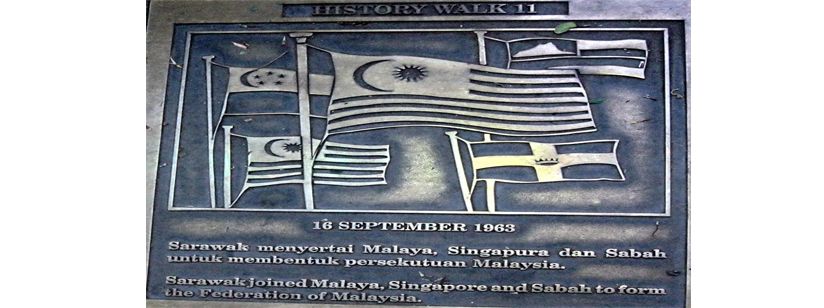
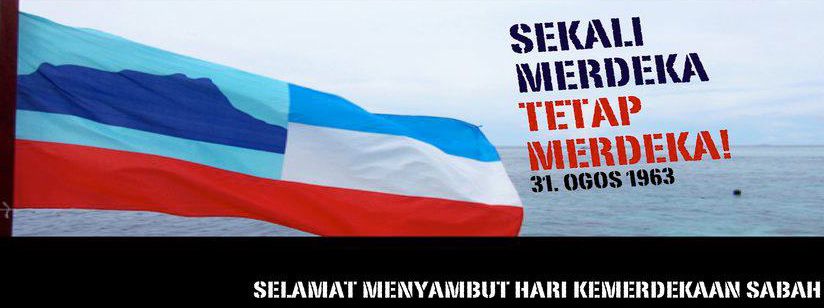
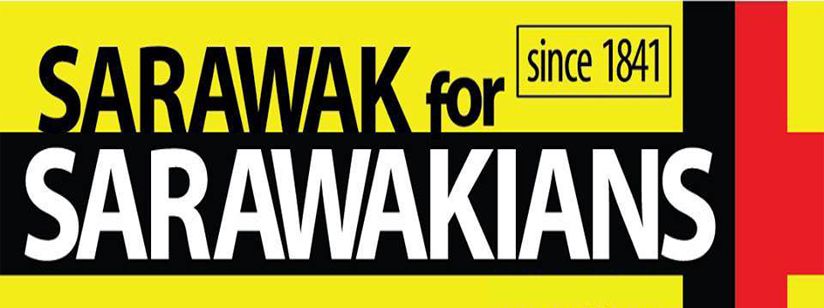



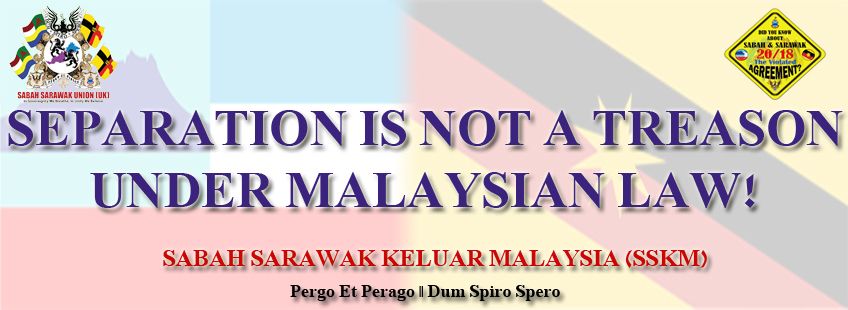
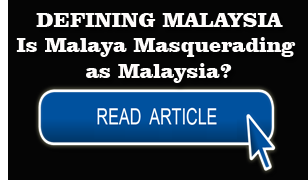
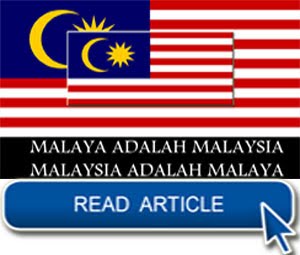
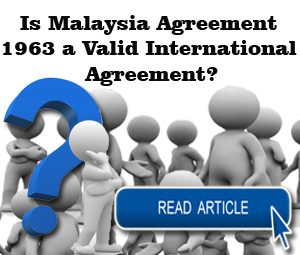

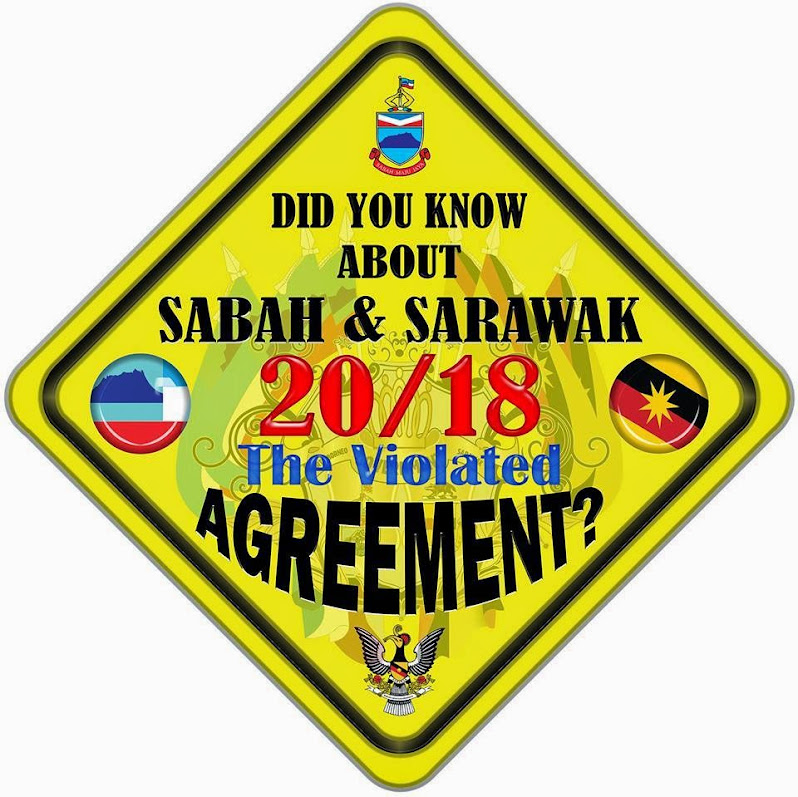
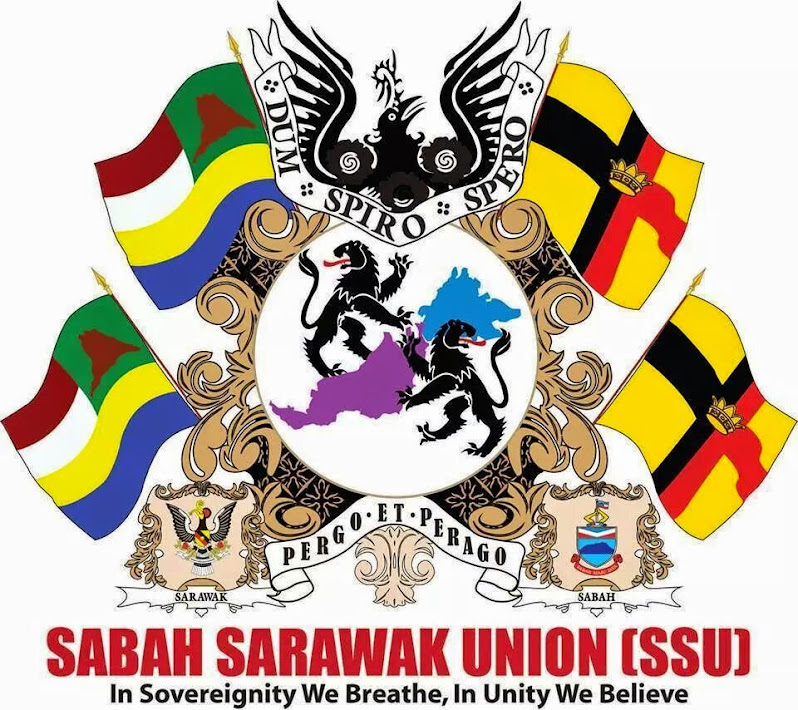
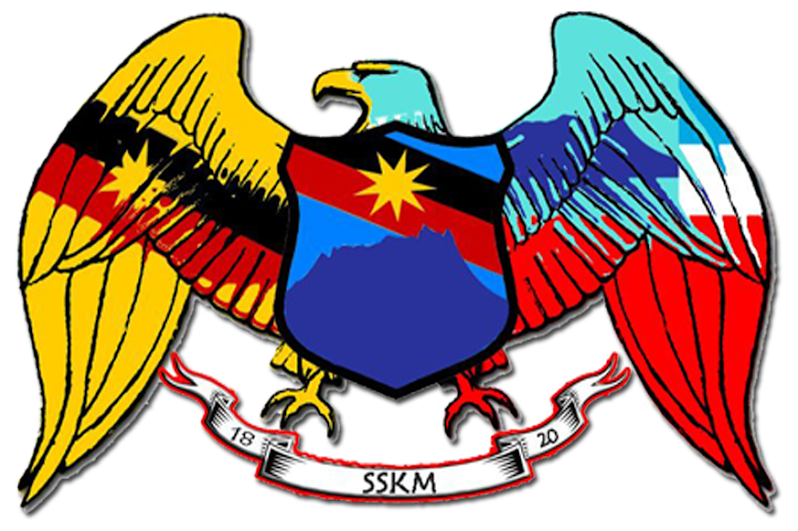

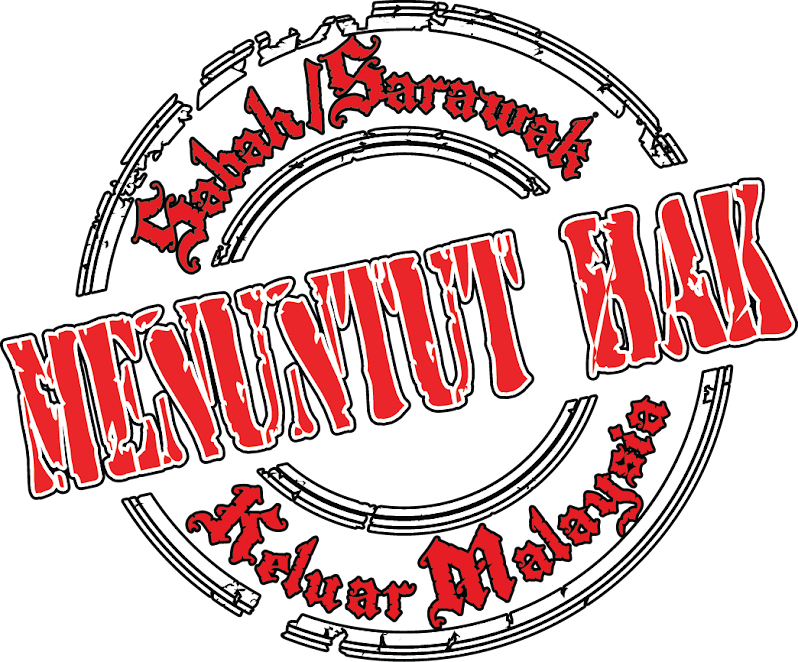
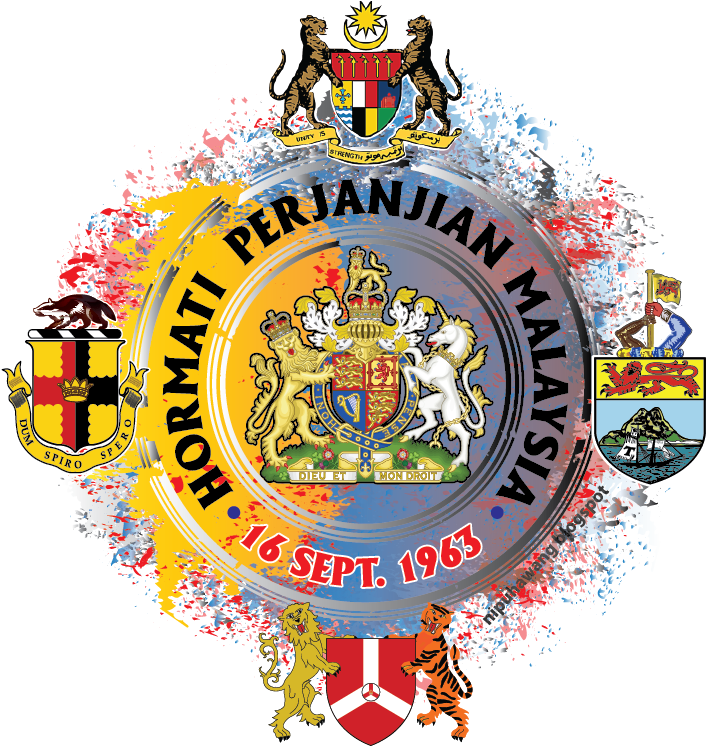


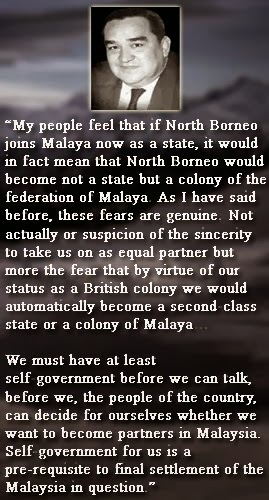
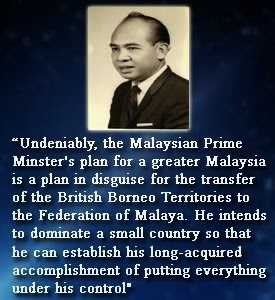



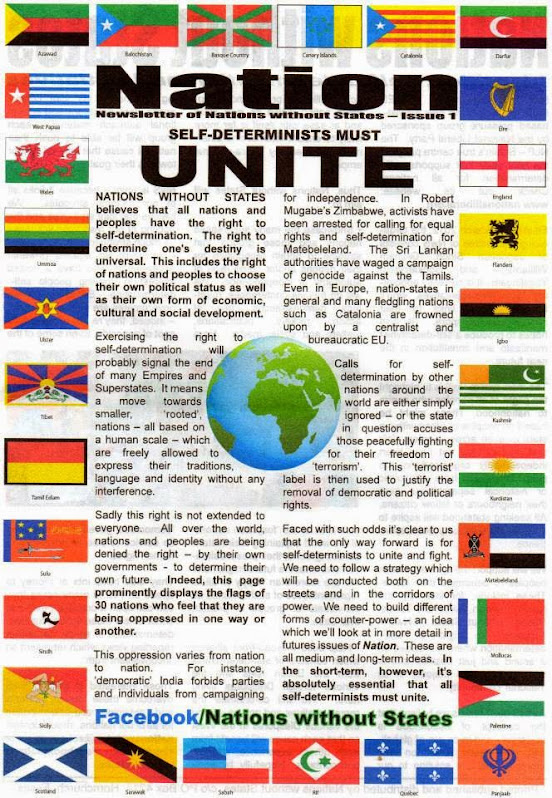








.jpg)

















